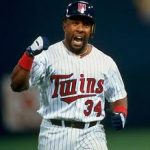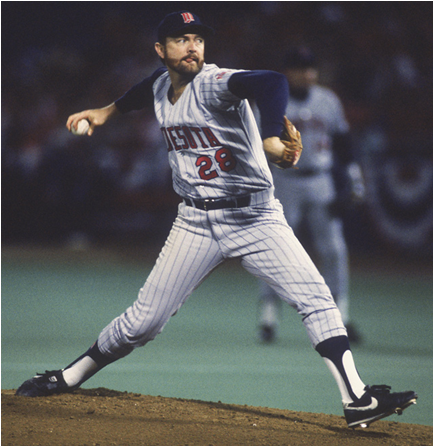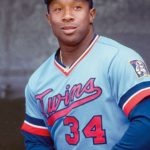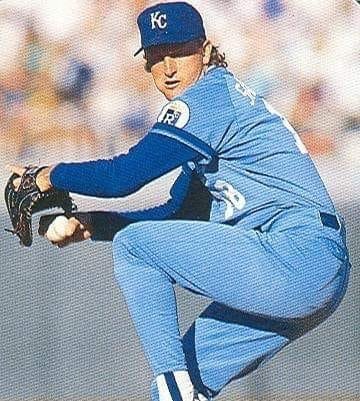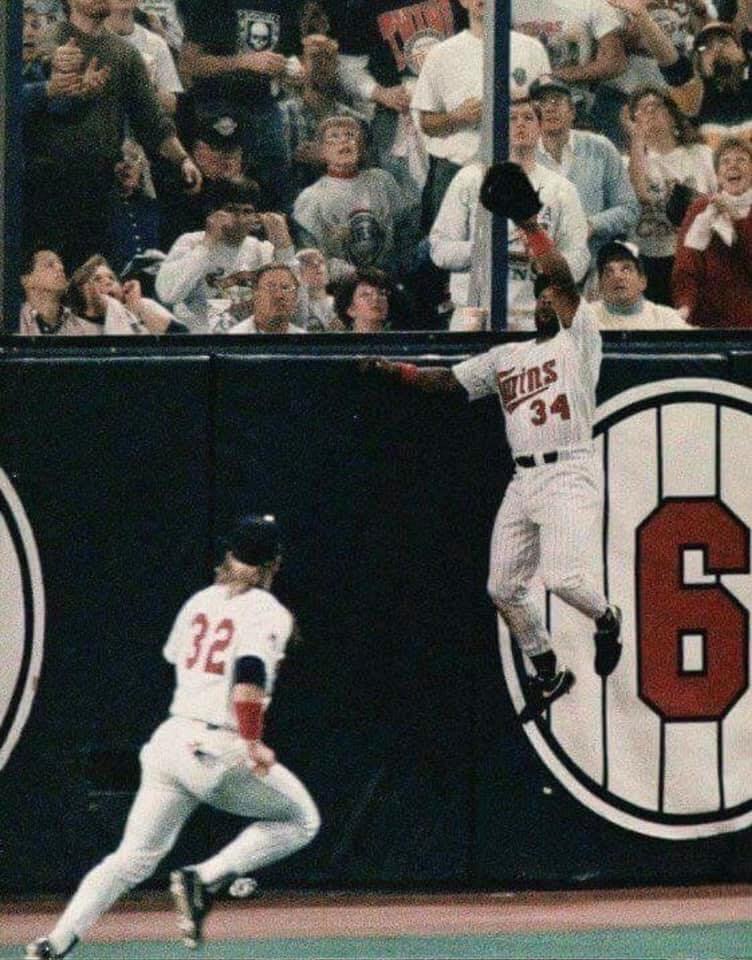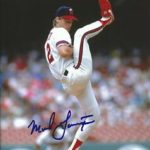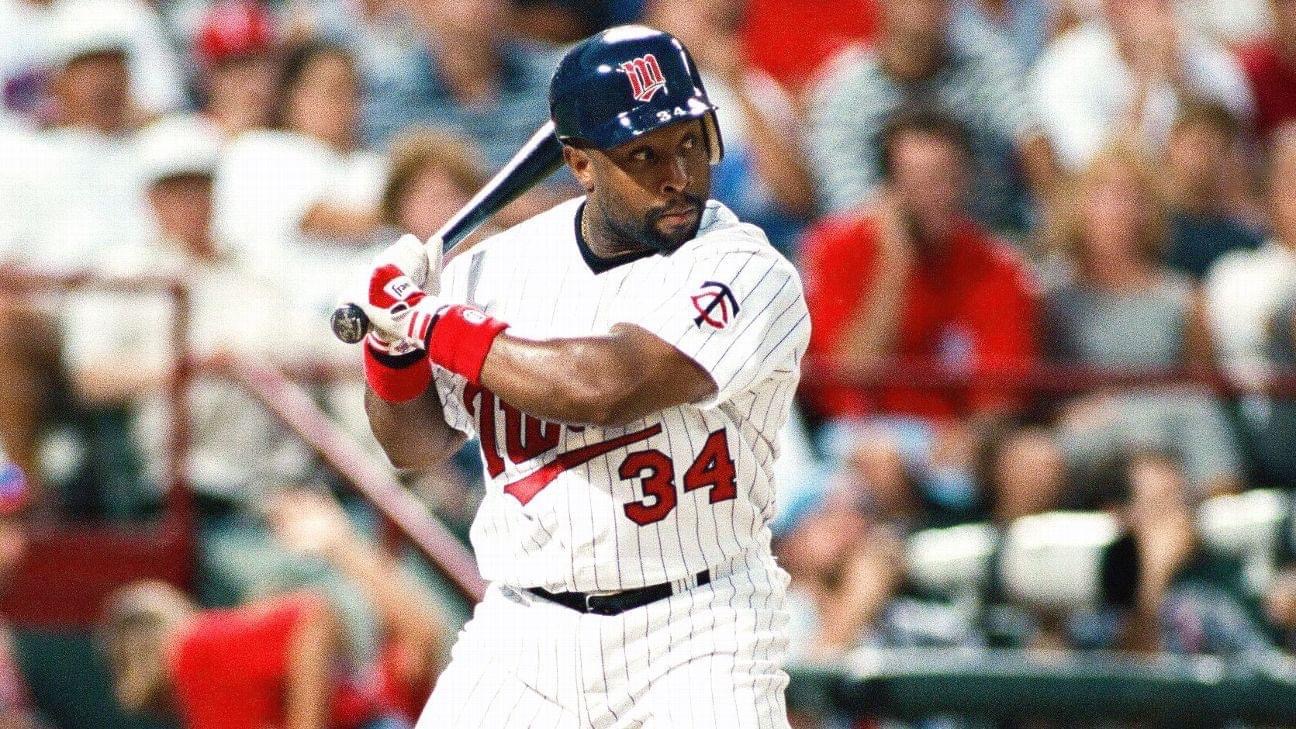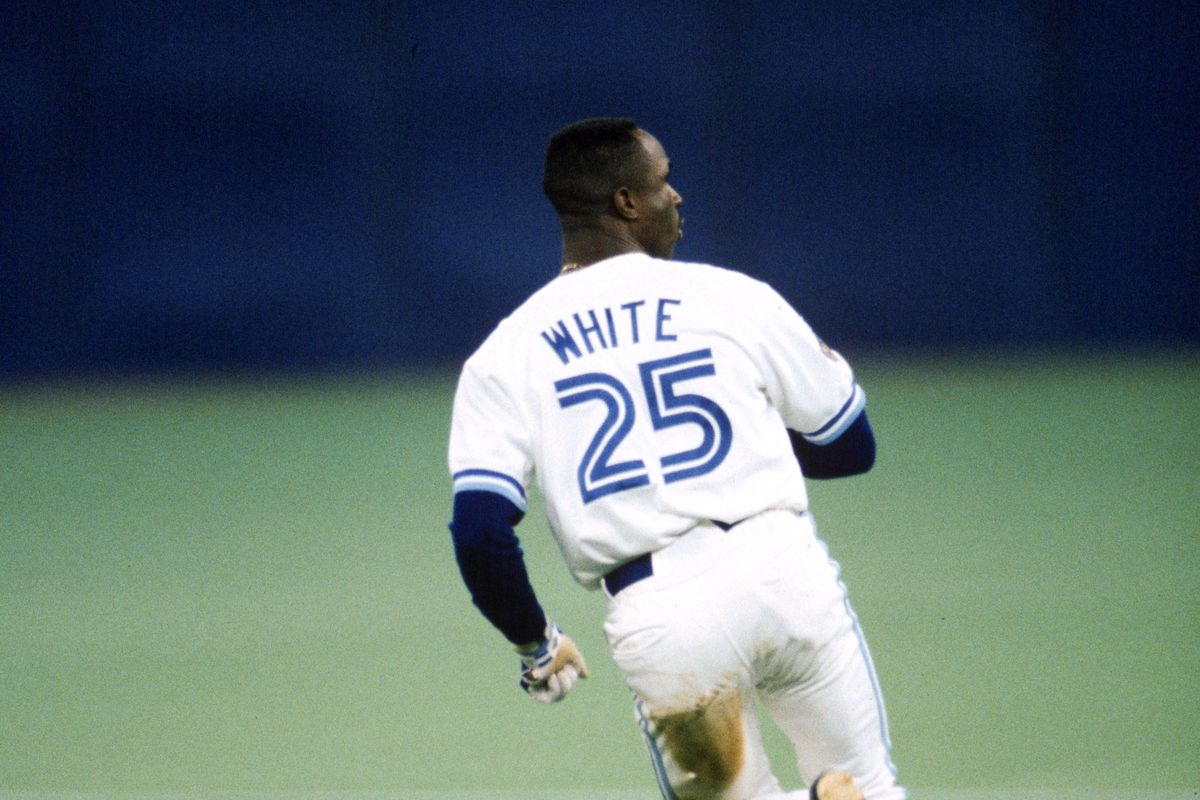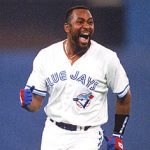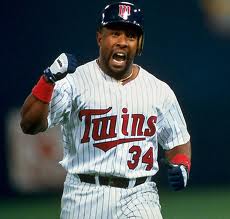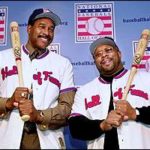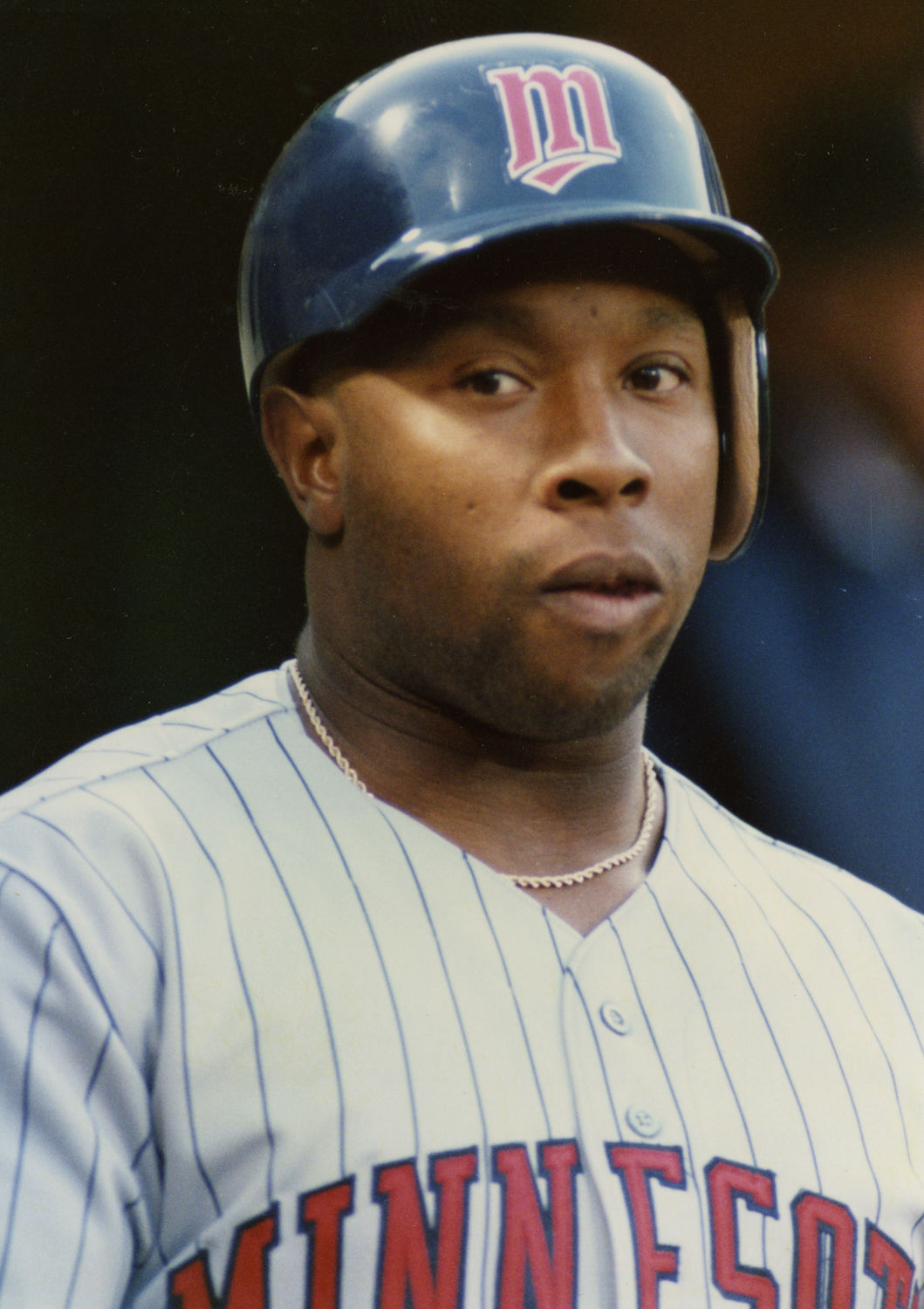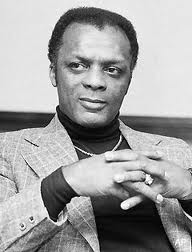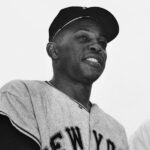Kirby Puckett Essentials
Positions: Centerfield
Bats: Right Throws: Right
5-8, 178lb (173cm, 80kg)
Born: March 14 1960 in Chicago, IL USA
Died: May 6, 2006 in Phoenix, AZ USA
Buried: Cremated
Debut: May 8, 1984 (14,905th in major league history)
vs. CAL 5 AB, 4 H, 0 HR, 0 RBI, 1 SB
Last Game: September 28, 1995
vs. CLE 0 AB, 0 H, 0 HR, 0 RBI, 0 SB
Hall of Fame: Inducted as Player in 2001. (Voted by BBWAA on 423/515 ballots)
View Kirby Puckett’s Page at the Baseball Hall of Fame (plaque, photos, videos).
Full Name: Kirby Puckett
Nicknames: Puck
View Player Info from the B-R Bullpen
View Player Bio from the SABR BioProject
Nine Other Players Who Debuted in 1984
Terry Pendleton
Kirby Puckett
Stan Javier
Eric Davis
Roger Clemens
John Franco
Dwight Gooden
Mark Langston
Bret Saberhagen
The Kirby Puckett Teammate Team
C: Brian Harper
1B: Kent Hrbek
2B: Chuck Knoblauch
3B: Gary Gaetti
SS: Greg Gagne
LF: Shane Mack
CF: Alex Cole
RF: Tom Brunansky
DH: Dave Winfield
SP: Bert Blyleven
SP: Frank Viola
SP: Scott Erickson
SP: Jack Morris
SP: Brad Radke
RP: Jeff Reardon
M: Tom Kelly
Notable Events and Chronology for Kirby Puckett Career
Biography
The Minnesota Twins have been known as the “piranhas,” a team built on speed and defense that annoys and frustrates opponents. But not too long before current Chicago White Sox manager Ozzie Guillen gave the Twins their fishy nickname, the Twins relied on the offensive prowess of players like Kirby Puckett.
Puckett was born in Chicago on March 14, 1960, and he attended Calumet High School before heading to Bradley University in Peoria. The future Hall-of-Famer didn’t stay there long, however. He transferred to Triton College in suburban Chicago before being drafted by the Twins in 1982.
Puckett’s numbers were above average during his first few seasons, but it wasn’t until 1986 or so that he started to move onto the main stage. That was the year that he earned his first All-Star nod and his first Gold Glove, all the while hitting .328.
One year later, the Twins were in the World Series, thanks in no small part to Puckett. He hit .332 during the season with 99 RBI and 28 homers, and his offense–.357 BA in the Series—helped propel the Twins over the St. Louis Cardinals in seven games. The center fielder had become a key part of the Twin’s arsenal, both on defense and offense.
Puckett continued to be an offensive leader, hitting .356 with 24 homers and 121 RBI in 1988. A year later, he earned his 1,000th hit, making him the fourth player to reach 1,000 hits in five seasons.
Puckett continued to play well, no matter what happened to his team in the standings. By 1991, the Twins were back in the World Series, thanks to Puckett’s .319 regular season average and .429/2/6 series against the Blue Jays in the ALCS, which won him the ALCS MVP.
Puckett single-handedly saved the Twins in a must-win Game 6, thanks to his circus catch against Ron Gant and his game-winning home run in the bottom of the 11th off of Charlie Leibrandt. He continued to have a strong offensive career, leading the league with 112 RBI in 1995.
The slightly pudgy outfielder was referred to affectionately as “Puck” by fans, and he always seemed to be smiling on and off the field. That happy-go-luck attitude belied the troubles ahead. No one could predict that vision problems would force such a prolific hitter into early retirement. No one knew that in 2006, he’d become the second-youngest Hall-of-Famer—following Lou Gehrig—to die, when he passed away at age 45. Nor did anyone foresee the legal battles that would befall him shortly before his death.
It was a shock to the baseball world when Puckett announced that was going to retire, do to glaucoma. He woke up one morning March of 1996 unable to see out of his right eye, placed on the DL (for the first time in his career), and after several surgeries were unable to restore vision, he was forced to retire. The keen eye that had served him well throughout his career had abandoned him, and the real world waited. The man who had become the face of the Twins—the only major league team he’d ever played for—was no longer able to perform on the baseball field.
In 2002, after his name had faded from the papers, Puckett found himself back in the news. Not because he’d become a broadcaster or front-office executive, but because he was being accused of sexually harassing a woman at a Minneapolis-area restaurant. He was later acquitted, but he was also later accused of performing other lewd acts in public. The Chicago kid who had perfected his image in front of thousands of screaming Minnesotans was no longer looked at as completely squeaky clean.
He’d earned first-ballot Hall-of-Fame honors, 10 All-Star nods, six Gold Gloves, and ALCS and All-Star Game MVP awards, but now he was being seen in a more critical light by the press and public. But his tragic fall wasn’t yet complete.
Early in 2006, news broke that Kirby Puckett had suffered a stroke at his Phoenix-area home. One day later, after emergency surgery had failed, Puckett died, at the young age of 45, just a bit more than a week shy of his 46th birthday. The man that they called “Puck” had lived just half a life, but he had packed so much—both positive and negative—into such a short life.
He now stands, immortalized in statue form, outside of the Twins’ new Target Field. In one form or another, Puckett will always be with the Twins.
Factoids, Quotes, Milestones and Odd Facts
Intro
In his first 1,248 major league at-bats Kirby Puckett hit just four home runs. In his third season he exploded for 31 homers and batted over .320 for the first of five times. He won the 1989 batting title and topped 200 hits five times. He played on the Twins only two World Series winning teams and was the most popular player in franchise history.
Quotes About
“He never had a bad day. I don’t care how bad things were going on or off the field, Kirby found a way to make you laugh… He was a breath of fresh air in this game.” — Frank Thomas
Best Season 1988
Following up the ’87 championship season, Puckett pounded out 234 hits, scored 109 runs, batted in 121, and clubbed 42 doubles. He batted .356 with 24 homers and a .545 slugging average. The Twins failed to repeat, but that was hardly Kirby’s fault. He finished third in MVP voting behind Jose Canseco.
Facts
Puckett had the most hits in the major leagues (1940) in the 10-year period from 1986 to 1995. Tony Gwynn was second with 1,842.
Feats
Puckett joined his mentor Tony Oliva and Ty Cobb as the only AL players to top the league in hits three straight seasons (1987-1989)… In the strike-shortened 1994 season he became one of the few players to record more RBI than games played (112-108).
Description
Puckett credited his power surge in 1986 to coach Tony Oliva, who helped Kirby by suggesting he kick his leg for extra weight shift and power transfer. The result was six seasons with at least 20 home runs and seven years of 35 or more doubles. Puckett’s batting title in 1989 was the first by a Twin since Rod Carew, and the first for a right-hander in a full season since Alex Johnson in 1970. After he won the batting title in 1989 he was rewarded with baseball’s first $3 million per year contract, quite an accomplishment for a player in small market Minnesota.
Notes
Career batting average of .337 against lefties (644-for-1912) and .311 against righties (1660-for-5332)… In All-Star contests, Puckett batted .292, and he was named 1993 All-Star Game MVP when he collected a double, home run, and two RBI… From 1986 to 1988, Puckett may have been the best player in baseball, winning three Gold Gloves, averaging 221 hits, 37 doubles, 13 steals, and a .339 batting average… No one was happier about Puckett’s election to the Baseball Hall of Fame than Cleveland Indians manager Charlie Manuel, Puckett’s minor league hitting coach at rookie league Elizabethon, Tennessee, in 1982. Manuel said he uses examples of Puckett’s play and attitude in motivational speeches to his players before games. Manuel said he became emotionally depressed for days when he heard that Puckett was forced to retire from baseball because of glaucoma.
Post-Season Notes
Puckett was MVP of the 1991 ALCS, hitting .429 with two homers and six RBI against the Blue Jays… In 1991 his game-ending home run won Game Six of the World Series, propelling the Twins into Game Seven, which they ultimately won. He was a clutch performer – hitting a home run, driving in three, and scoring five runs in the 1987 playoff win over favored Detroit. In that season’s World Series he went 10-for-28 (.357) with 3 RBI, 5 runs, and a stolen base. In 1991 he improved upon that clutch image when he battered the Blue Jays in the ALCS, batting .429 (9-for-21) with two homers and 6 RBI. He homered in the final game and drove in the go-ahead run with a double in the 8th inning. For those efforts he was named ALCS MVP… In 10 AL Championship Series games, Puckett batted .311 with three homers and nine RBI. Puckett appeared in the World Series against the Cardinals in 1987 and Braves in 1991, helping the Twins win both seven-game series. Puckett’s World Series statistics include a .308 batting average, 16 hits, two homers, and seven RBI. In 1991, he became the ninth player to end a World Series game with a home run, belting an eleventh inning walk-off tater in Game Six off Charlie Liebrandt.
Feats
Puckett joined his mentor Tony Oliva and Ty Cobb as the only AL players to top the league in hits three straight seasons (1987-1989)… In the strike-shortened 1994 season he became one of the few players to record more RBI than games played (112-108).
Injuries and Explanation for Missed Playing Time
On September 28, 1995, Puckett was struck in the face by a pitch from Dennis Martinez. The incident ended his season with a broken jaw. In the spring of 1996 it was revealed that he had glaucoma, resulting in damage to the vision in his right eye. He would never play again. In 1997 the Twins retired his jersey #34.
Hitting Streaks
23 games (1993)
All-Star Selections
1986 AL
1987 AL
1988 AL
1989 AL
1990 AL
1991 AL
1992 AL
1993 AL
1994 AL
1995 AL
Other Resources & Links


